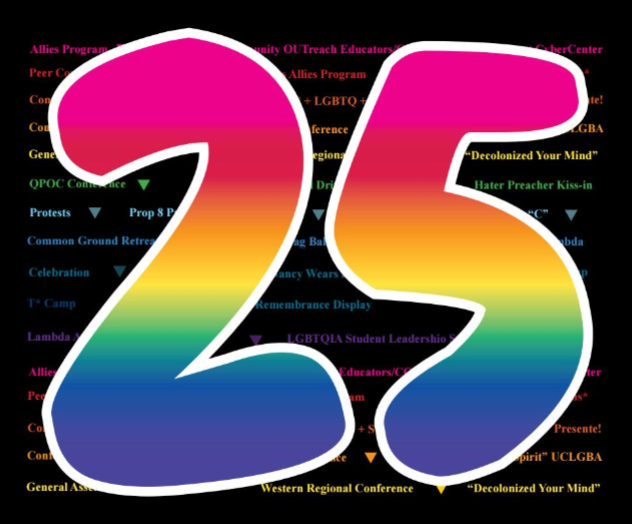
Walking into 245 Costo Hall, the room is decorated with colorful posters and inspirational quotes. A shelf near the entrance contains a variety of LGBT books and graphic novels available for anyone to read. Students sit on the couches talking about their day while others enter the center casually, as if they are arriving home. For the past 25 years, the LGBT Resource Center (LGBTRC) has provided support, education and advocacy for LGBT students on campus.
In 1993, UCR became the first university in California to have a professionally staffed LGBT resource center. In 2019, the center celebrated its 25th anniversary, and a quarter century of hosting and helping with the development of programs, services and outreach events.
“The center is important because we provide education, advocacy and community for those on campus who need it. And places like this are special to me because I was a student who utilized these places and now I work for those students who were like me,” said Megan Rush, the LGBTRC program coordinator.
One of the LGBTRC’s biggest programs is their Tuesday Talks Series. Since 1998, every Tuesday at 5 p.m., the center has provided a confidential space for open discussion about topics relating to the LGBT community. The discussions are staff facilitated and the topics rotate every week, from stories about coming out to gender presentation in fashion.
“For me, attending Tuesday Talks is a nice physical reminder that there are other queer people on campus and that there are people in general here who support and understand you, and I really appreciate the center for giving us a space for all of us to converge,” stated Margarita Manzo, a first-year creative writing major.
Another significant program provided by the center is their group of Community Outreach Educators (CORE). CORE is a peer education program where student volunteers are trained to educate others regarding sexual orientation, gender identity and about the LGBT community in general. Nancy G. Tubbs, director of the LGBTRC said, “CORE started out with a handful of students speaking on panels and now we have 50 students formally involved in the program.”
“The center helped me feel comfortable navigating the spaces, having those conversations. It also helped me foster inclusive language, like them pronouns as my standard. It’s made me incredibly comfortable with my sexuality and my gender expression, something that for many queer people you grapple with and question over the years,” shared fourth-year Alex Camacho, co-president of Queer Alliance.
Much of the success that the center has originates from student involvement and advocacy; for example, the annual Dragalicious Drag Ball was founded by students. Drag Ball is one night where the center shines a spotlight on student drag performances, dance routines, spoken word, fashion and comedy. Earlier this quarter, the 16th Dragalicious Drag Ball raised $1,700 for student scholarships.
“My performance at that Drag Ball was a Marcel Marceau. He did mime performances, reinvented it, and he did one about masks. He’d paint it and put it on his face, acting as a sort of caricature. For me, (my favorite part of the Ball is) the storytelling; I love to tell stories, I love to kind of push myself as an artist. As a performer, as a drag queen, I have to put on a face to be able to perform, to be able to have that confidence to tell a story,” said third-year linguistics major Crescent Rose.
Alongside hosting events, the LGBTRC and students have worked to implement policy changes on the UCR campus as well. Together, they pushed for Stonewall Hall, gender-inclusive housing and multi-stall restrooms on campus and the preferred name policy. Currently, they are working on the California Gender Recognition Act, which recognizes non-binary identities.
“I think one thing to remember is the power of student voices but also in collaboration with staff and faculty. It takes all members of the campus community to be behind the efforts to make a case on a college campus that this is a resource the university should invest in,” commented Tubbs.
The center’s outreach and influence has stretched beyond the campus of UCR as well. In the last couple of years they have hosted conferences such as ASTERISK, the Trans Conference, BlaqOUT and Presente! as a way to highlight the LGBTQ community throughout the region as well. This fall, the center is hosting the second California community college LGBTQ summit. One of the goals of the summit is to help students return to their respective campuses and advocate for spaces like the LGBT resource center.
The passage of the Highlander Empowerment Referendum in the recent ASUCR elections secured the center’s presence and future more than ever. With their funding safe, the LGBTRC will continue to address LGBT-related policy issues across campus. Along with that, the center wants to continue addressing mental health awareness and expand their CORE community outreach educators program.
“I hope every UCR student knows that everyone is welcome to come to the center. We have folks of every sexual orientation and gender identity coming in. Even though a student might not be LGBTQ themselves, they probably have friends and family who are, even if they might not know it yet, or even in the future will have children who are LGBTQ. Take advantage of these resources while you can,” said Tubbs.







